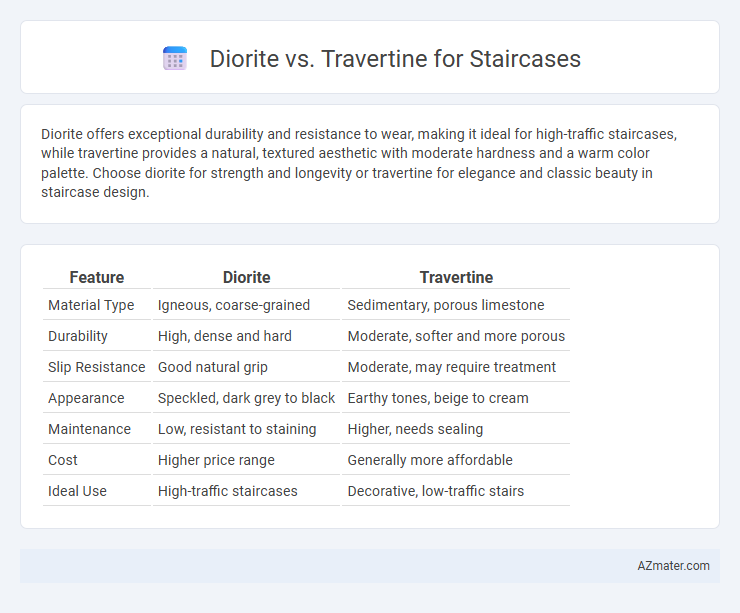Diorite offers exceptional durability and resistance to wear, making it ideal for high-traffic staircases, while travertine provides a natural, textured aesthetic with moderate hardness and a warm color palette. Choose diorite for strength and longevity or travertine for elegance and classic beauty in staircase design.
Table of Comparison
| Feature | Diorite | Travertine |
|---|---|---|
| Material Type | Igneous, coarse-grained | Sedimentary, porous limestone |
| Durability | High, dense and hard | Moderate, softer and more porous |
| Slip Resistance | Good natural grip | Moderate, may require treatment |
| Appearance | Speckled, dark grey to black | Earthy tones, beige to cream |
| Maintenance | Low, resistant to staining | Higher, needs sealing |
| Cost | Higher price range | Generally more affordable |
| Ideal Use | High-traffic staircases | Decorative, low-traffic stairs |
Introduction to Diorite and Travertine
Diorite is a durable, coarse-grained igneous rock known for its speckled appearance and high resistance to wear, making it an excellent choice for staircases that require longevity and strength. Travertine, a sedimentary rock formed from calcium carbonate deposits, offers a smooth, porous texture with natural earth-toned hues, providing an elegant and sophisticated aesthetic for staircases. Both materials are popular in architectural design, but diorite excels in durability while travertine is favored for its classic and warm visual appeal.
Geological Origins of Diorite and Travertine
Diorite forms deep within the Earth's crust as an intrusive igneous rock, characterized by its coarse-grained texture and composed mainly of plagioclase feldspar and hornblende. Travertine, on the other hand, originates from the precipitation of calcium carbonate in mineral-rich hot springs or limestone caves, classified as a sedimentary rock with a porous surface. The durable, dense composition of diorite contrasts with the softer, more porous nature of travertine, influencing their suitability and maintenance for staircases.
Physical Properties Comparison
Diorite exhibits exceptional hardness and density, making it highly resistant to wear and abrasion, ideal for high-traffic staircases. Travertine, characterized by its porous texture and lower density, offers superior slip resistance but requires sealing to prevent staining and weathering. Both stones provide durability, but diorite's greater compressive strength and minimal water absorption enhance longevity under heavy use.
Aesthetic Appeal and Design Versatility
Diorite offers a striking, speckled pattern with a polished finish that enhances modern and minimalist staircase designs. Travertine provides a natural, textured surface with warm earthy tones, lending itself to Mediterranean and rustic styles. Both stones deliver unique aesthetic appeal and adaptable design options, but Diorite's bold contrast suits sleek interiors while Travertine complements softer, organic themes.
Durability and Strength for Staircases
Diorite offers exceptional durability and high compressive strength, making it ideal for staircases that require long-lasting performance and resistance to wear. Travertine, while aesthetically appealing with its natural pores and texture, is softer and more porous, requiring sealing and more maintenance to withstand heavy foot traffic on staircases. For robust structural support and minimal upkeep, diorite is the preferred choice over travertine in staircase applications.
Slip Resistance and Safety Features
Diorite offers superior slip resistance for staircases due to its dense, coarse-grained texture, minimizing accident risks in high-traffic areas. Travertine, while aesthetically appealing with natural porous patterns, generally requires sealing and anti-slip treatments to enhance safety on stair surfaces. Choosing diorite ensures durability and safer footing, especially in wet or outdoor environments where slip hazards are heightened.
Maintenance and Cleaning Requirements
Diorite requires minimal maintenance due to its dense, non-porous structure, making it highly resistant to stains and easy to clean with mild soap and water. Travertine, being a porous natural stone, demands regular sealing to prevent moisture penetration and staining, and should be cleaned with pH-neutral cleaners to avoid etching. Both materials benefit from routine dusting, but Diorite offers greater durability and lower upkeep for staircase surfaces in high-traffic areas.
Cost Comparison: Diorite vs Travertine
Diorite typically costs between $50 to $100 per square foot, making it a higher-priced option for staircases due to its durability and unique granular appearance. Travertine, ranging from $20 to $50 per square foot, offers a more affordable choice with its porous texture and classic aesthetic, but may require more maintenance over time. Considering installation and long-term upkeep, travertine is generally more budget-friendly, while diorite commands a premium price for its strength and low maintenance.
Environmental Impact and Sustainability
Diorite, a dense igneous rock, offers high durability with low porosity, reducing the need for frequent replacement and minimizing resource consumption over time in staircase applications. Travertine, a sedimentary stone formed through mineral deposits in hot springs, is more porous and often requires sealing, which can introduce additional chemical treatments affecting sustainability. The environmental impact of sourcing diorite tends to be higher due to intensive quarrying, while travertine's natural formation and widespread availability may result in a lower carbon footprint when sustainably harvested and responsibly processed.
Final Recommendations for Staircase Material Selection
Diorite offers exceptional durability and a polished aesthetic, making it ideal for high-traffic staircases requiring long-lasting wear resistance. Travertine provides a classic, textured appearance with natural slip resistance, suitable for decorative staircases in moderate-use areas. For safety and longevity, diorite is recommended in commercial or frequently used spaces, while travertine suits residential or low-traffic staircases where design elegance is prioritized.

Infographic: Diorite vs Travertine for Staircase
 azmater.com
azmater.com